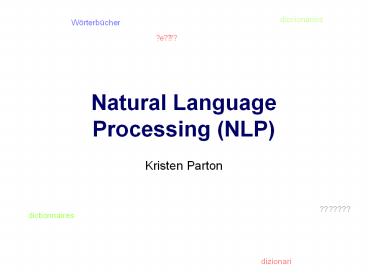Natural Language Processing (NLP) - PowerPoint PPT Presentation
Title:
Natural Language Processing (NLP)
Description:
Natural Language Processing (NLP) ... Semantics: How can we infer ... Segmenting Chinese, tokenizing English, de-compoundizing German, – PowerPoint PPT presentation
Number of Views:391
Avg rating:3.0/5.0
Title: Natural Language Processing (NLP)
1
Natural Language Processing (NLP)
- Kristen Parton
2
What is NLP?
- Natural languages
- English, Mandarin, French, Swahili, Arabic,
Nahuatl, . - NOT Java, C, Perl,
- Ultimate goal Natural human-to-computer
communication - Sub-field of Artificial Intelligence, but very
interdisciplinary - Computer science, human-computer interaction
(HCI), linguistics, cognitive psychology, speech
signal processing (EE), - Shall we play a game? (1983)
3
Real-word NLP
4
How does NLP work
- Morphology What is a word?
- ???????(??????µp?a??? ????e?,????????)???????????
???????????????????,???????? - ??????? to her houses
- Lexicography What does each word mean?
- He plays bass guitar.
- That bass was delicious!
- Syntax How do the words relate to each other?
- The dog bit the man. ? The man bit the dog.
- But in Russian ??????? ?????? ???? ???????
???? ??????
5
How does NLP work
- Semantics How can we infer meaning from
sentences? - I saw the man on the hill with the telescope.
- The ipod is so small! ?
- The monitor is so small! ?
- Discourse How about across many sentences?
- President Bush met with President-Elect Obama
today at the White House. He welcomed him, and
showed him around. - Who is he? Who is him? How would a computer
figure that out?
6
Examples from Prof. Julia Hirschbergs slides
7
Spoken Language Processing
- Speech Recognition
- Automatic dictation, assistance for blind people,
indexing youtube videos, automatic 411, - Related things we study
- How does intonation affect semantic meaning?
- Detecting uncertainty and emotions
- Detecting deception!
- Why is this hard?
- Each speaker has a different voice (male vs
female, child versus older person) - Many different accents (Scottish, American,
non-native speakers) and ways of speaking - Conversation turn taking, interruptions,
Examples from Prof. Julia Hirschbergs slides
8
Spoken Language Processing
- Text-to-Speech / Spoken dialog systems
- Call response centers, tutoring systems,
- Related things we study
- Making computer voices sound more human
- Making computer speech acts more human-like
9
Machine Translation
10
Machine Translation
- About 10 billion spent annually on human
translation - Hotels in Beijing, China
- ???????????????????????????,????????,??,??80??????
?????,????368????,??????0.5?1?????,????,??, ...? - Yesterday, I called out when Art Long vowed to
ensure that the four-star hotel, to live in. I
see no future, I rely on it in the 80s may be
regarded as a four-star, and I want the big
368-bed Room, the room is only one 0.5 m
1-meter small windows, what we can see, I rely
on, ...? - "????????,????????????????????,?????,????????????
,?????????? ..." - "I came back from the hotel, would like to
express my own views. The overall impression a
good location, good prices, but services in
general or too general, the level of the front
reception and efficiency ..."
11
Why is machine translation hard?
- Requires both understanding the from language
and generating the to language. - How can we teach a computer a second language
when it doesnt even really have a first
language? - Can we do machine translation without solving
natural language understanding and natural
language generation first?
What hunger have I I've got that hunger I am so
hungry
Que hambre tengo yo
Ella deja que el gato fuera de la bolsa
She let the cat out of the bag.
12
(No Transcript)
13
Rosetta Stone (not the product)
- Example of parallel text same text in two or
more languages - Hieroglyphic Egyptian, Demotic Egyptian and
classical Greek - Used to understand hieroglyphic writing system
14
Statistical Machine Translation
- Lots and lots of parallel text
- Learn word-for-word translations
- Learn phrase-for-phrase translations
- Learn syntax and grammar rules?
Taken from Prof. Chris Mannings slides
15
NLP Conclusions
- NLP is already used in many systems today
- Indexing words on the web Segmenting Chinese,
tokenizing English, de-compoundizing German, - Calling centers (Welcome to ATT)
- Many technologies are in use, and still improving
- Machine translation used by soldiers in Iraq
(speech to speech translation?) - Dictation used by doctors, many professionals
- Lots of awesome research to work on!
- Detecting deception in speech?
- Tracking social networks via documents?
- Can a computer get an 800 on the verbal SAT? (not
yet!)
16
NLP _at_ Columbia
- CS4705 Natural Language Processing
- CS4706 Spoken Language Processing
- CS6998 Search Engine Technology, CS6870 Speech
Recognition, CS6998 Computational Approaches to
Emotional Speech, - Related to the Artificial Intelligence track
- Professor Kathleen McKeown
- Professor Julia Hirschberg
- Researchers Owen Rambow, Nizar Habash, Mona Diab,
Rebecca Passonneau (_at_ CCLS) - Opportunities for undergrad research ?
17
Taken from Prof. Chris Mannings slides
18
Natural Language Understanding
- Syntactic Parse
Taken from Prof. Chris Mannings slides
19
Why is this customer confused?
- A And, what day in May did you want to travel?
- C OK, uh, I need to be there for a meeting
thats from the 12th to the 15th. - Note that client did not answer question.
- Meaning of clients sentence
- Meeting
- Start-of-meeting 12th
- End-of-meeting 15th
- Doesnt say anything about flying!!!!!
- How does agent infer client is informing him/her
of travel dates?
Examples from Prof. Julia Hirschbergs slides
20
Question Answering
- How old is Julia Roberts?
- When did the Berlin Wall fall?
- What about something more open-ended?
- Why did the US enter WWII?
- How does the Electoral College work?
- May want to ask questions about non-English,
non-text documents and get responses back in
English text.
21
Natural Language Understanding
Taken from Prof. Chris Mannings slides































